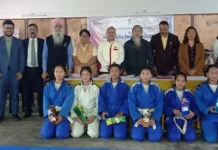NEW DELHI, Dec 23: The United States Agency for International Development (USAID) recently awarded the Institute for Financial Management and Research approximately $800,000 through the Development Innovation programme to test a policy to replace electricity subsidies for farmers with lump-sum cash transfers as an incentive to conserve power and water.
The pilot is currently being rolled out in Punjab and Rajasthan.
State and national governments in India provide electricity subsidies to rural farmers to help defray the cost of pumping water for irrigation. However, the subsidy can also result in unsustainable water pumping in areas already facing severe water shortages.
The NITI Aayog estimates that water levels are declining in 52 percent of India’s 20 million wells, with 820 million people across India facing water scarcity.
With support from the USAID, the Poverty Action Lab of South Asia at the Institute for Financial Management and Research is testing a new ‘win-win policy’ to replace electricity subsidies for farmers with lump-sum cash payment.
The farmers can choose to spend the payment on electricity, the equivalent of the status quo, or reduce their electricity consumption and keep the money. This new approach gives farmers an incentive to conserve power and water, and if found to be effective, could be scaled across India to improve conservation or reduce the negative impacts of other subsidies.




